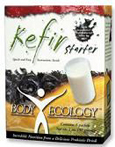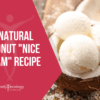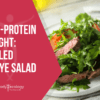Is Yogurt Really Good for You? Find Out the Healthiest Probiotic Dairy Food You May Have Overlooked
One of the latest and greatest health foods receiving praise from the media is yogurt. With the many new probiotic yogurts to hit the market these days, many people depend on yogurt for healthy digestion. But, if you are looking for the best dairy-based probiotic to provide health benefits to your diet, probiotic yogurt may not be all it’s cracked up to be. Instead, make way for milk kefir. It will soon become one of your top choices in fermented foods and can impressively enhance your diet!
Milk Kefir Benefits
Kefir has a number of benefits. It aids in digestion and helps your body better process proteins, fats, and carbohydrates. Kefir has also been used for thousands of years to boost the immune system and even provide anti-aging benefits. In short, kefir is an age old cultured food full of:
- Calcium
- Enzymes
- Magnesium
- Amino acids
- B vitamins

Did you know that kefir means “feel good” in Turkish? And that’s exactly what you will experience when you enjoy this food in your daily diet!
Milk Kefir vs.Yogurt
The main difference between yogurt and milk kefir is the type of microflora used during fermentation and in how they are made. Yogurt traditionally was made only with bulgaricus and thermophilus bacteria. Acidophilus and bifidus bacteria are usually added these days since they are better known. Milk kefir is made with friendly bacteria and beneficial yeast. Yogurt is heated and pasteurized. Since milk kefir is warmed only to “skin temperature”, you can use healthy raw milk to make it.
Both milk kefir and yogurt can colonize your intestinal tract with friendly microflora, but store-bought yogurt does not contain nearly the amount of these “good guys” as milk kefir. Kefir is much more “alive.”
Enjoying fermented foods like milk kefir regularly in your diet will help you maintain a healthy weight. Come again? Yes, it is a fact that an imbalanced inner ecosystem can lead to weight gain. Since a robust inner ecosystem (IES) is essential for a healthy immune system, an imbalanced IES will leave you at risk for illness and disease.
Milk kefir is one of the best probiotics to include in your diet if you want to keep weight off, prevent illness, and even reduce fatigue on a daily basis! Even better, this choice in probiotic foods is easy to make at home.
How to Use the Body Ecology Kefir Starter in 5 Easy Steps:
- Mix the entire contents of one foil package of kefir starter and one quart of slightly warmed milk (at body temperature or 92°) into a glass container with a lid.
- Whip this mixture with a whisk to mix, and place the lid on the container.
- Allow this mixture to ferment at 72-75°F for 18 to 24 hours. You will know that it is ready if the milk has thickened and has a sour fragrance. The final consistency should be easy to pour but not suitable to eat with a spoon.
- Stir well, and place in the refrigerator. The fermentation process will continue even in the refrigerator, but chilling will slow down the fermentation of the beneficial yeast and healthy bacteria.
- When you are ready to make your second batch of kefir, simple take a few tablespoons of your first batch and add it to fresh warmed milk. (Directions for making and transferring kefir after the initial batch has been made can be found inside the packaging. You’ll also find directions for making kefir cheese.)
The shelf life of Body Ecology’s Kefir Starter is 12 months from the manufactured date in the refrigerator, or longer when it is stored in the freezer.
Kefir is traditionally made with cow’s milk, but it can also be made using coconut, rice, goat, or sheep’s milk. It makes a wonderful addition to smoothies! Children rushing off to school in the morning find kefir to be an excellent nourishing breakfast. To make it even more kid friendly, try flavoring it with stevia and vanilla extract. It’s a sugar-free, fermented, high-protein way to start the day.
Sources:
FOCUS ON DAIRY RESEARCH. November 2004.
http://www.foodnavigator.com/news/listnews.asp?m=10&y=2006
Propionic acid beverage could boost satiety, by Jess Halliday
http://www.nutraingredients-usa.com/news/ng.asp?id=84051-propionic-acid-satiety-dairy








